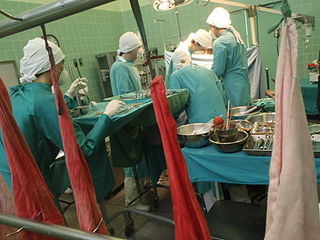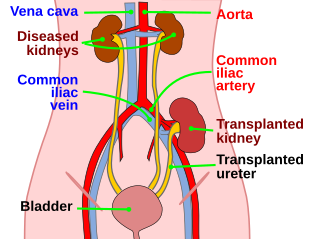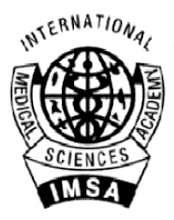
Organ donation is the process when a person authorizes an organ of their own to be removed and transplanted to another person, legally, either by consent while the donor is alive, through a legal authorization for deceased donation made prior to death, or for deceased donations through the authorization by the legal next of kin.

Organ transplantation is a medical procedure in which an organ is removed from one body and placed in the body of a recipient, to replace a damaged or missing organ. The donor and recipient may be at the same location, or organs may be transported from a donor site to another location. Organs and/or tissues that are transplanted within the same person's body are called autografts. Transplants that are recently performed between two subjects of the same species are called allografts. Allografts can either be from a living or cadaveric source.

Brain death is the permanent, irreversible, and complete loss of brain function, which may include cessation of involuntary activity necessary to sustain life. It differs from persistent vegetative state, in which the person is alive and some autonomic functions remain. It is also distinct from comas as long as some brain and bodily activity and function remain, and it is also not the same as the condition locked-in syndrome. A differential diagnosis can medically distinguish these differing conditions.

Kidney transplant or renal transplant is the organ transplant of a kidney into a patient with end-stage kidney disease (ESRD). Kidney transplant is typically classified as deceased-donor or living-donor transplantation depending on the source of the donor organ. Living-donor kidney transplants are further characterized as genetically related (living-related) or non-related (living-unrelated) transplants, depending on whether a biological relationship exists between the donor and recipient. The first successful kidney transplant was performed in 1954 by a team including Joseph Murray, the recipient's surgeon, and Hartwell Harrison, surgeon for the donor. Murray was awarded a Nobel Prize in Physiology or Medicine in 1990 for this and other work. In 2018, an estimated 95,479 kidney transplants were performed worldwide, 36% of which came from living donors.

Sir Roy Yorke Calne was a British surgeon and pioneer in organ transplantation. He was part of the team that performed the first liver transplantation operation in Europe in 1968, the world's first liver, heart and lung transplantation in 1987, the first intestinal transplant in the UK in 1992 and the first successful combined stomach, intestine, pancreas, liver and kidney cluster transplantation in 1994.
Organ procurement is a surgical procedure that removes organs or tissues for reuse, typically for organ transplantation.

Başkent University is a private university in Ankara, Turkey. The university was founded on 13 January 1994 by Professor Dr. Mehmet Haberal. The university center is located in Ankara and also has medical and research centers and dialysis centers all around Turkey.
Organ trade is the trading of human organs, tissues, or other body products, usually for transplantation. According to the World Health Organization (WHO), organ trade is a commercial transplantation where there is a profit, or transplantations that occur outside of national medical systems. There is a global need or demand for healthy body parts for transplantation, which exceeds the numbers available.

Nadey S. Hakim FASMBS, is a British-Lebanese professor of transplantation surgery at Imperial College London and general surgeon at the Cleveland Clinic London. He is also a writer, musician and sculptor, known for kidney and pancreas transplantations, and being part of the surgical team that performed the world's first hand transplantation in 1998 and then the double arm transplantation in 2000. Several of his sculptures are on display around the world, including President Macron at the Élysée Palace in Paris, Pope Francis at the Vatican, Michelangelos David in the Madonna del Parto Museum collection, and Kim Jong-un at the Pyongyang Museum in North Korea.

Mehmet Haberal, is the founder of Başkent University in Ankara, Turkey, best known for becoming the first transplant surgeon in Turkey after leading the team that performed Turkey's first living-related kidney transplant in 1975, after he returned from surgical training under the mentorship of American surgeon Thomas Starzl, with whom he also performed some of the longest surviving early liver transplantations.
Many different major religious groups and denominations have varying views on organ donation of a deceased and live bodies, depending on their ideologies. Differing opinions can arise depending on if the death is categorized as brain death or cease of the heartbeat. It is important for doctors and health care providers to be knowledgeable about differentiating theological and cultural views on death and organ donations as nations are becoming more multicultural.

Dr. Arvinder Singh Soin is the Chief Hepatobiliary and Liver Transplant Surgeon & Chairman of the Institute of Liver Transplantation and Regenerative Medicine, Medanta-The Medicity, India. A surgeon and pioneer in the field of liver transplantation, acknowledged for his work in establishing liver transplantation in India. Dr. Soin also runs the Liver Transplant institute at the Sir H. N. Reliance Foundation Hospital, Mumbai. Dr Soin has performed more than 3500 living donor liver transplants in India, which is the highest in the country, and the second-highest in the world.

A heart transplant, or a cardiac transplant, is a surgical transplant procedure performed on patients with end-stage heart failure or severe coronary artery disease when other medical or surgical treatments have failed. As of 2018, the most common procedure is to take a functioning heart, with or without both lungs, from a recently deceased organ donor and implant it into the patient. The patient's own heart is either removed and replaced with the donor heart or, much less commonly, the recipient's diseased heart is left in place to support the donor heart.

The practice of selling one's kidney for profit in Iran is legal and regulated by the government. In any given year, it is estimated that 1400 Iranians sell one of their kidneys to a recipient who was previously unknown to them. Iran currently is the only country in the world that allows the sale of one's kidney for compensation ; consequently, the country does not have either a waiting list or a shortage of available organs.

Sunil Shroff is the managing trustee of a non-government and non-profit organisation called MOHAN Foundation and is well known for his work in the field of deceased donation transplantation in India. He has worked towards improving the deceased organ donation rate in India.

Fikri Alican was a Turkish scientist and physician with various contributions to medical science, ranging from organ transplantation to physiology.
Refaat R. Kamel is an Egyptian surgeon and past world president of the International College of Surgeons. He is one of the surgeons depicted in Henry Ward's 2010 painting ‘’The 'Finger-Assisted' Nephrectomy of Professor Nadey Hakim’’. He has been elected president of the Middle East Society for Organ Transplantation (MESOT) for 2018 to 2020.

The International Medical Sciences Academy (IMSA) is a global organization founded in 1981 with the aim of improving universal health. It is registered as a professional body under the Societies Registration Act of India and is based in New Delhi, India. It publishes the Journal of the International Medical Sciences Academy and is an associate member of the Council for International Organizations of Medical Sciences.
Experimental and Clinical Transplantation is the official journal of the Middle East Society for Organ Transplantation. The scope of the journal includes surgical techniques, innovations, immunobiology and immunosuppression, clinical results and complications. Its editor-in-chief is Mehmet Haberal and there are six issues per year. Its policy is to ensure that all authors of its articles adhere to the rules and regulations stated in the Declaration of Istanbul and by the Committee on Publication Ethics.
Faissal Shaheen is a Saudi nephrologist and co-founder of the Jeddah kidney center in King Fahad Hospital Jeddah and the Saudi Center for Organ Transplantation. In 2003 he led the Saudi team involved in the first kidney transplantation in the Arab World, in Aden, Yemen. He is the president of the International Society for Organ Donation and Procurement from 2019 to 2021.














